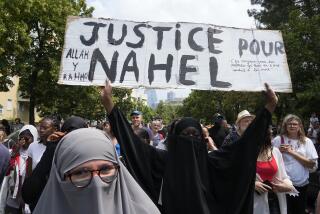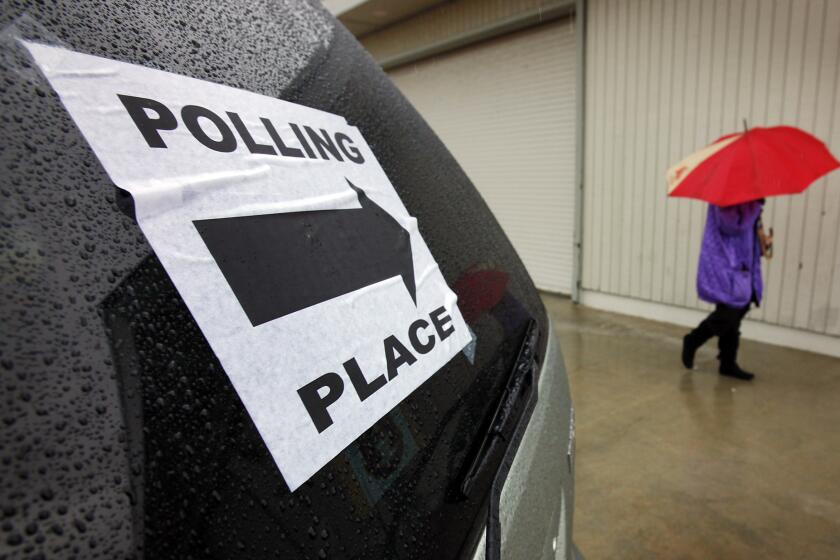Chirac Admits France’s Complicity With Nazis : Europe: For the first time, a French president acknowledges the nation’s role in the deportation of Jews during World War II.
PARIS — President Jacques Chirac acknowledged Sunday what a generation of political leaders did not--that the French state was an accomplice to the deportation of tens of thousands of Jews during World War II.
At a ceremony to commemorate the 53rd anniversary of the roundup of at least 13,000 Jews at a Paris stadium--the biggest during the war years--Chirac said that French complicity with the Nazis was a stain on the nation.
“These dark hours soil forever our history and are an injury to our past and our traditions,” Chirac told the gathering at the former site of the Velodrome d’Hiver stadium in western Paris.
“The criminal folly of the [German] occupier was seconded by the French, by the French state,” he said.
Chirac, a conservative who took office in May, is the first French president to publicly recognize France’s role in the deportations of Jews under the Vichy regime of Marshal Philippe Petain, which collaborated with the Nazis.
In all, about 75,000 Jews were deported from France to Nazi concentration camps during World War II. Only 2,500 survived.
Chirac’s predecessor, Socialist President Francois Mitterrand, maintained that the Vichy regime did not represent the French republic and its actions were not those of the state.
That attitude pained France’s large Jewish community, which has long pressed authorities to come to grips with the nation’s collaborationist past.
At dawn on July 16, 1942, French police banged on doors throughout Paris, pulling men, women and children from their homes and rounding them up at the cycling stadium. The families were imprisoned for three days without food or water, then deported to Auschwitz. Only a handful returned.
The roundup was considered particularly heinous because of the French fervor in making arrests, a tactic aimed at appeasing the Nazis to gain more independence for Vichy.
“France, the nation of light and human rights, land of welcome and asylum, accomplished the irreparable,” said Chirac. “Betraying its word, it delivered its dependents to their executioners.”
In a clear warning against today’s extreme-right National Front, Chirac also urged vigilance against attempts by some political parties to promote a racist, anti-Semitic ideology.
Noted Nazi hunter Serge Klarsfeld hailed Chirac for his “courage” and said that the president’s words were “what we had hoped to hear one day.”
“It is a turning point. . . . It is, finally, looking the truth in the face, lifting the veil,” said Henri Hajdenberg, president of the Representative Council of Jewish Institutions of France.
Chirac’s statements culminated a process that gained pace in 1994 when a court for the first time convicted a French citizen, Paul Touvier, of crimes against humanity. The former pro-Nazi militia chief is serving a life term for ordering the executions of six Jews in June, 1944.
Mitterrand, a Vichy official before joining the anti-Nazi resistance, was the first president to lay a wreath at the memorial on the riverside site of the stadium, demolished after World War II.
In 1993, he declared July 16 a “national day of remembrance of the racist and anti-Semitic persecutions committed under the de facto authority of the so-called government of the French state in 1940-1944.”
But Jews and many Resistance veterans were angered because Mitterrand sent a wreath each year to the grave of Petain, the Vichy head of state, in honor of his heroism during World War I.
Chirac, like Mitterrand, made a distinction between Vichy and the rest of the nation, which he called “upright, generous, faithful to its traditions, its genius.”
“This France was never at Vichy,” Chirac said, but was “everywhere that the Free French fought,” a reference to the Resistance forces. France, he said, “is not an anti-Semitic nation.”
Several deportation survivors attended Sunday’s ceremony, along with representatives of the Jewish community and the archbishop of Paris, Cardinal Jean-Marie Lustiger, a Jew who converted to the Roman Catholic faith.
More to Read
Sign up for Essential California
The most important California stories and recommendations in your inbox every morning.
You may occasionally receive promotional content from the Los Angeles Times.










